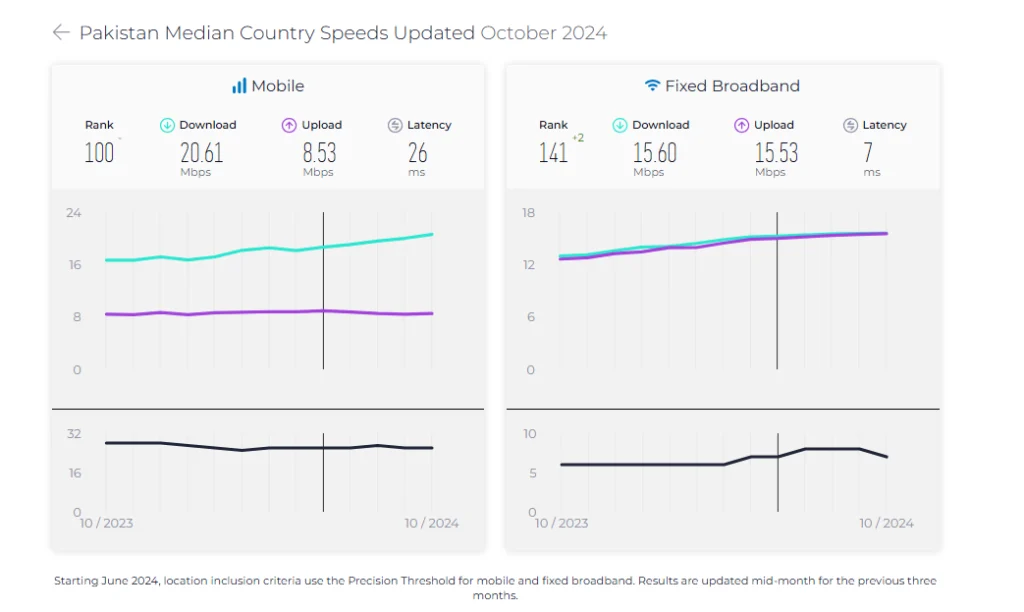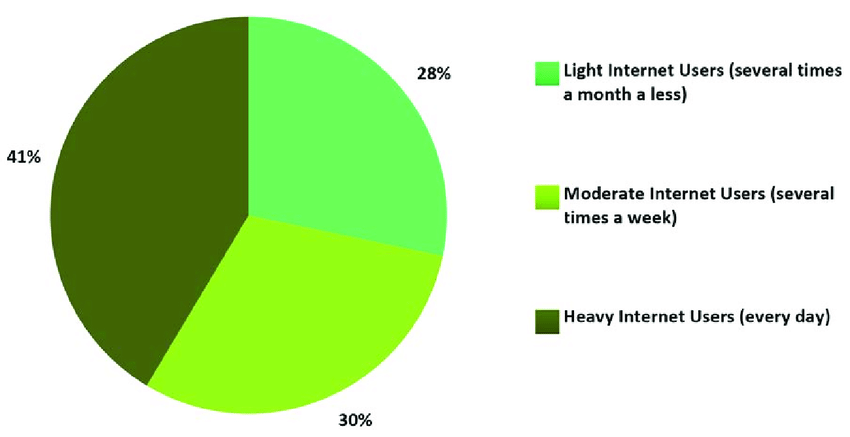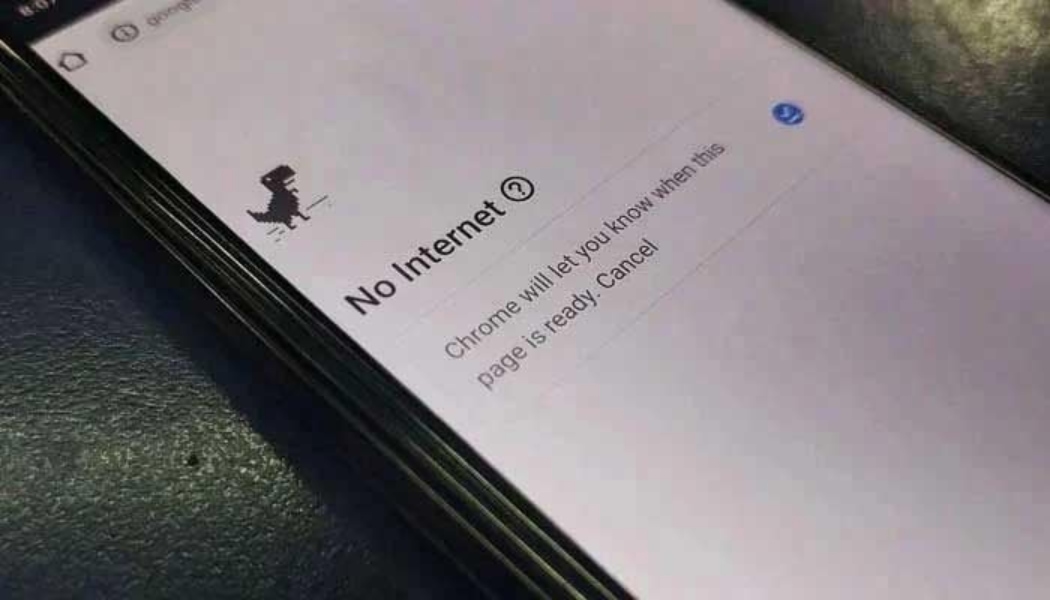Pakistan Ranks the Worst in Global Rankings for Internet Speed
- December 18, 2024
- No Comments
Pakistan now has a challenge with the internet because it ranks among the nations with the slowest internet connections worldwide.
According to Ookla’s Speed test Global Index in October 2024; it is ranked 141 out of 158 for broadband and 100 out of 111 for mobile internet speed. Its dismal average download speed of 7.85 Mbps places it in the lowest 12% of global internet performance, which is a serious setback in this increasingly interconnected world.
An In-Depth Look at the Stats at the Statse
In Pakistan, the median internet speed is 15.52 Mbps, while the average mobile download speed is 19.59 Mbps. In contrast, Bangladesh and India, two nearby countries, have average mobile speeds of 25 Mbps and over 40 Mbps, respectively. These are far greater in more developed economies, sometimes surpassing 100 Mbps.

Pakistan’s rural areas continue to be chronically underserved, whereas urban areas such as Karachi and Lahore have slightly better internet access. The rural population’s options are restricted by the digital gap, which also makes socioeconomic disparities worse.
Continuous Disruptions and VPN Restrictions
In Pakistan, blackouts have become more frequent and severe due to the prevalence of internet disturbances. Users have complained about issues such as interrupted video chats, trouble downloading files, and trouble accessing a number of crucial web services. Students, distant workers, and companies that heavily rely on digital platforms have all expressed extreme irritation about this type of problem.
The government’s crackdown on unregistered virtual private networks is making matters worse. Authorities say it’s because of illicit financial activities and security worries about terrorism. Many Pakistanis now have no way to access prohibited content because it has disabled their lifeline.
These VPNs are the sole way for users to access websites like X (previously Twitter) and other blocked websites. Threatening to shut unregistered connections, the Pakistan Telecommunication Authority (PTA) has made VPN registration mandatory. Amnesty International and other human rights groups have denounced these actions, pointing to possible misuse of surveillance technologies and transparency issues.

Economic Implications of Poor Connectivity
Slow internet has major financial consequences for Pakistan. Every year, the nation loses millions of rupees due to poor connectivity, which hinders digital business, e-commerce, and productivity. Globally, the digital economy accounts for over 15.5% of GDP; as a result, nations with more developed infrastructure are experiencing quicker growth. Slow upload and download speeds in Pakistan prevent companies from accessing global markets.
The problem is especially severe for freelancers, who make up the nation’s expanding digital workforce. Pakistan is one of the world’s leading freelance markets, but its ability to effectively compete is hampered by inconsistent internet.
Comparisons with Regional Peers
Pakistan, a regional peer, on the other hand, paints a completely different picture. The average mobile internet speed in India, which has made significant investments in 4G and 5G infrastructure, is 47 Mbps. By extending fiber-optic connectivity to rural areas, the nation’s broadband programs have helped close the digital divide.
Even with comparable socioeconomic difficulties, internet services have advanced in Bangladesh. Because of improvements in their digital infrastructures and legislation that encourages healthy competition among ISPs, Bangladesh’s average speed is 27 Mbps.
With an average mobile speed of 31 Mbps, Sri Lanka also surpasses Pakistan in this area. As a comparatively digitalized nation, Sri Lanka may now leverage its robust internet infrastructure to enhance its online educational and e-governance initiatives.

Human Rights and Transparency Issues
Concerns have been raised by Amnesty International and other observers about Pakistan’s growing use of internet restrictions as a political tactic. In 2024, the government has conducted multiple internet firewall experiments that have caused significant disruptions and slowdowns. Opponents contend that such measures, taken in the name of cybersecurity, severely discriminate against citizens’ access to information and silence dissenting opinions.
Transparency is a major problem. The public is not given much information about the technologies being employed when the government uses cyber threats as an excuse for its actions. This kind of secrecy raises concerns about privacy invasion and censorship.
Bridge the Gap
The internet situation in Pakistan necessitates a multifaceted approach.
Infrastructure Investments: It is necessary to upgrade the current infrastructure and expand the fiber-optic network. These projects can be financed through public-private partnerships.
Regulatory Reforms: To enhance service quality and accessibility, ISP competition will be promoted and VPN limitation rules will be reviewed.
Digital literacy: It enables citizens to utilize the internet responsibly by educating them about the advantages and dangers of digital tools. Transparency: The government should guarantee that cybersecurity protocols are open and do not infringe upon citizens’ digital rights.
High stakes
If it doesn’t improve its internet situation, Pakistan, which excels at digital connectivity, is more likely to fall further behind. Due to these current circumstances, a greater portion of its population consists of young individuals who would not profit from internet access. Because of their erratic internet access, they are unable to access online education, skill development, and even worldwide employment chances.
Furthermore, the fact that digital payments and e-commerce are increasingly essential components of global trade means that Pakistan could become even more isolated from global markets if it doesn’t keep up. Closing the digital divide is as important for social and economic success as it is for ease.
The poor internet connections and frequent outages in Pakistan are a highly worrying sign for the country’s digital future. These difficulties might be lessened with focused investments, legislative changes, and a dedication to openness. But for the time being, the path ahead is still high, and the price of doing nothing is rising.
Stay tuned with creatugroup for more info.

